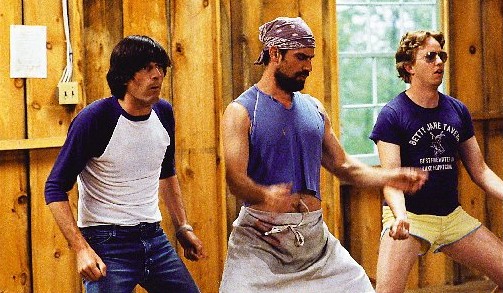Culture
Head To Head: The science of the parody

Here at Heave, Dominick and I both rank Black Dynamite and Wet Hot American Summer as two of our favorite movies. Both are a calculated kind of stupid. Despite our love for both movies, we have different answers to an important question: which movie is the better parody?
Dominick Mayer
Setting aside for a second that Black Dynamite needs to be in the conversation about the funniest films of the past decade, I want to look at exactly why it’s so brilliant. After all, it’s far from the first film to spoof blaxploitation, and in fact others have done it far more famously (I’m Gonna Git You Sucka, Undercover Brother, even Pootie Tang to an extent), if not nearly as well. Black Dynamite works because it’s not only a parody of blaxploitation, but also a damned fine blaxploitation film in its own right.
Where the other movies that I mentioned settle for the surface elements of the genre (hokey performances, low-budget effects, absurdist plots), Dynamite uses those as a starting point to craft a series of comic setpieces of escalating lunacy. Michael Jai White’s titular turn as the intrepid jack-of-all-ghetto-trades is invaluable, because he possesses the unflappable persona of greats like Fred Williamson, but a self-aware comedic timing that those gentlemen never did (Williamson, notably, hates the term “blaxploitation”). The film plays fast and loose with plot, as it’s really just a series of vignettes involving Dynamite attempting to unearth a vast conspiracy to keep the black man down.
Because of this loose approach, the film pays homage to the over-the-top spirit of the ’70s greats (seriously, go back and watch the last half hour of Foxy Brown and you’ll realize that White and co. aren’t far off) while always remaining disciplined with respect to avoiding overly easy targets. The perfect example of such discipline lies in the jaw-dropping centerpiece of the film, a train-of-thought sequence in a diner where Black Dynamite and his cohorts uncover the dark secrets of a government-approved malt liquor (spoilers ahead):
For a parody film, Black Dynamite is smart enough to play to both its desired audience (lovers of blaxploitation) while also clever enough to work with just about any audience. With tough-guy White at the forefront (the man has black belts in seven different disciplines IRL), it toes the line between legitimacy and parody in a way that most films not only fail to attempt in most cases, but couldn’t pull off if they tried.
Joe Anderson
First of all, I concede that blaxplotation possesses way more cultural significance than summer camp movies. Most college film studies courses will screen Foxy Brown way before Meatballs. But that’s exactly why I love Wet Hot American Summer: summer camp movies are a stupid genre to begin with. Parodying an esoteric genre—not to mention director David Wain’s weird-ass sense of humor—initially alienated a general audience but now resonates with the alt-comedy crowd, which has become increasingly more mainstream over the past few years.
It’s worth noting Summer parodies source material that is inherently funny and lighthearted. This is dangerous territory; spoofing something that is already funny is reminiscent of an outraged Youtube response video by someone who missed the joke. Summer avoids this by making some very smart choices.
Whereas Black Dynamite follows all the conventions of blaxplotation (and don’t get me wrong, the film is meticulous in this regard), Summer acknowledges genre conventions and proceeds to fully ignore them. For a movie about a summer camp, Summer goes out of its way to put the kid campers in situations that are the antithesis of summer camp; one kid drowns because Paul Rudd’s character is too busy making out, a group of arts and crafts kids spend most of the movie helping Molly Shannon cope with a divorce, and so on.
Instead, all of the “coming of age” growth falls on the cast of adults as they pursue summer romances like a bunch of 14-year-olds. Without spoiling too much, here’s a triumphant speech given by the camp’s cook (played by Chris Meloni of Law and Order: SVU fame) about being true to yourself. And sometimes being true to yourself means telling a mess hall full of kids that you fondle sweaters and smear mud on your ass. Enjoy: